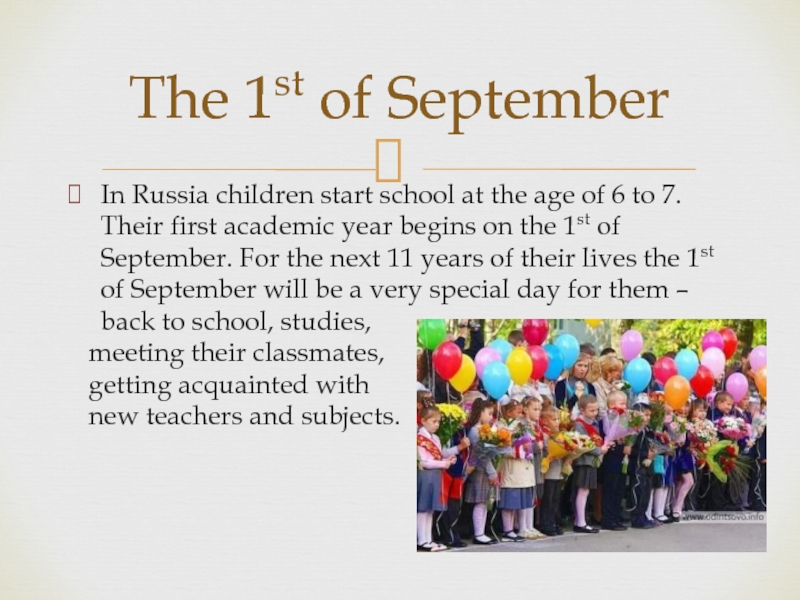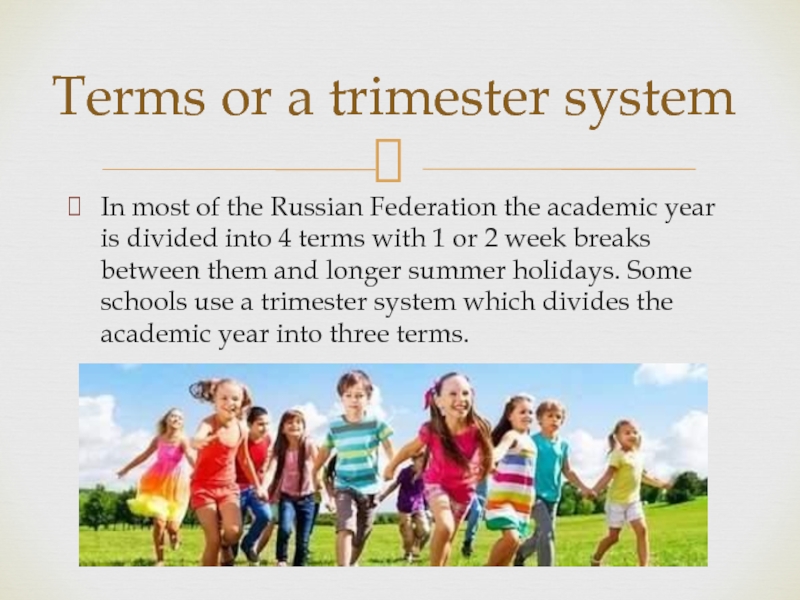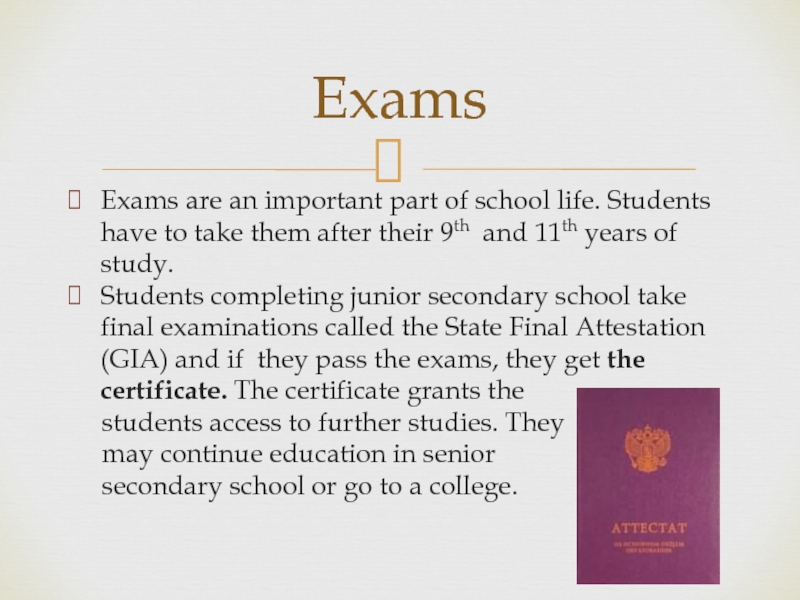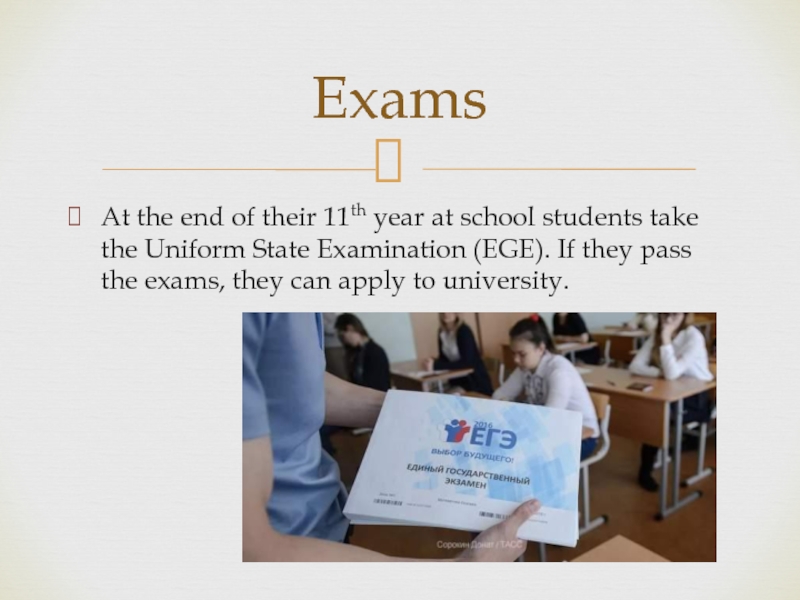Школьная система в россии на английском 7 класс
Обновлено: 04.07.2024
Топик (сочинение) по английскому языку на тему Education in Russia — Образование в России
Education plays a very important role in our life. It is one of the most valuable possessions a man can get in his life.
The literacy rate in Russia is almost 100%. Half of Russia’s adults has at least college education. So Russia has the highest college-level education in the world.
Russia has pre-school educational system. About 2/3 of children aged 5 attend kindergartens. Since the age of 6 or 7 children attend school. Eleven-year secondary education in Russia is compulsory. School term has 3 stages: elementary (grades 1-4), middle (grades 5-9) and senior (grades 10-11) classes.
Before 1990 the course of school training was 10-years, but since 1990 school study lasts for 11 years. Education in state schools is free. Male and female students have equal rights in all stages of education.
The school year starts in September 1 and finishes in May. It is divided into four terms. Study programme in schools is fixed. It means that schoolchildren can’t choose subjects they want to study.
When children finish school, they have to pass the Unified state examination (USE). It’s the set of standardised tests.
University level of education in Russia is high. The country inherited a system of high level of education from the Soviet Union.
into primary school (grades from 1 to 4), junior secondary school (grades from 5 to 9) and senior secondary school (grades from 10 to 11). Kids study 5 or 6 days a week in primary school, and 6 days in junior and senior secondary school. The academic year is divided into 4 terms. There are breaks for holidays between the terms. Some schools divide the academic year into 3 terms. Exams are an important part of school life. Students have to take exams after the 9th and the 11th year of study at school. After the 9th year students take the State Final Attestation. If they pass the exams, they get the certificate. After they go on with further studies at school or they can go to a college. At the end of the 11th year they take the Uniform State Examination. If they pass the exams successfully they can apply to university. There are some schools with advanced programmes in selected disciplines such as foreign languages, mathematics or sports.
Ответ или решение 1
Школьная система в России. Дети начинают учиться с 7 лет. Школа в России разделена на начальную школу (1-4 классы), среднюю школу (5-9классы), старшую школу (10-11 классы). Дети в начальной школе учатся 5-6 дней в неделю. В средней и старшей- 6 дней в неделю. Учебный год разделен на 4 четверти. Между ними есть перерывы на каникулы. В некоторых школах год разделен на 3 четверти. Экзамен- самая важная часть школьной жизни. Студенты сдают экзамены после 9 и 11 классов. После 9-ого класса ученики сдают Государственную Итоговую Аттестацию. Если они сдают экзамены, то получают сертификат. После этого они могут продолжать учёбу дальше или перейти в институт. В конце 11-ого класса они сдают Единый Государственный Экзамен. Если они сдают его, то могут попасть в университет. Есть несколько школ с продвинутыми программами по отдельным дисциплинам, такими как иностранные языки, математика или спорт.
Перед чтением текста проверьте себя знаете ли вы слова: compulsory, primary education, secondary education, comprehensive, ability, entrance exams, specialized schools, profound knowledge, academic subjects, higher education, enter a university, take exams, pass exams, fail exams.
(text about the Russian Educational System for intermediate level)
- Is education compulsory in Russia?
- What kind of school do you attend?
- Do you pay for your education?
- Would you like to study in a private school? Why?
Words for the text:
- academic subjects – учебные предметы
- competition – зд. конкурс
- fierce — жесткий
- public — государственный
- bachelor’s degree – диплом бакалавра
- specialist’s degree – диплом инженера
- master’s degree – диплом магистра
- higher education — высшее образование
- institutions of higher education — высшие учебные заведения
All Russian children have the right to education, but it is not only a right, it is a duty, too. Education in our country is compulsory and now lasts eleven years. It consists of primary education and secondary education.
Primary education starts at the age of 6 or 7 and continues for four years. After finishing primary school pupils go on to secondary school. The school year starts in September and ends in May. Generally there 4 school terms with holidays up to 10 days between them. The summer holidays last from June to September.
Most schools in Russia are comprehensive, which take pupils of all abilities without entrance exams. As a rule, pstudents go to school 5 days a week. But there are also specialized schools, lyceums and gymnasiums, which give profound knowledge in various academic subjects. In lyceums and gymnasiums students study 6 days a week.
After finishing the 9th form students must take 4 examinations. Then young people can choose to stay at school, enter a college or a technical school. But to enter a university they have to study for two more years (either at school or at college).
Higher education in Russia.
There are many colleges and universities in our country, but it is not easy to enter a university or college as the competition is rather fierce. Most of the colleges and universities are public and students do not have to pay for their education.
After 4 years of study students can pass examinations and get a bachelor’s degree, after 5 years a specialist’s degree and after 6 years a master’s degree.
There are a lot of institutions of higher education in our country:
- the Moscow State University (Московский Государственный Университет)
- the Linguistic University, known as Maurice Thorez Institute of Foreign Languages (Лингвистический Университет, известный как Институт иностранных языков имени Мориса Терезы)
- People’s Friendship University of Russia (Российский Университет Дружбы Народов)
They are well-known not only in Russia but also abroad.
Задание. Retell the text to make sure that you have remembered the words:
Слайды и текст этой презентации
School system in Russia

In Russia children start school at the age of 6 to 7. Their first academic year begins on the 1st of September. For the next 11 years of their lives the 1st of September will be a very special day for them – back to school, studies,
meeting their classmates,
getting acquainted with
new teachers and subjects.
The 1st of September
School in Russia is divided into primary school (grades 1 - 4), junior secondary school (grades 5 - 9) and senior secondary school (grades 10 - 11).
Kids study for 5 days a week in primary school and 5 or 6 days in junior and senior secondary school.
Schools in Russia

In most of the Russian Federation the academic year is divided into 4 terms with 1 or 2 week breaks between them and longer summer holidays. Some schools use a trimester system which divides the academic year into three terms.
Terms or a trimester system

Exams are an important part of school life. Students have to take them after their 9th and 11th years of study.
Students completing junior secondary school take final examinations called the State Final Attestation (GIA) and if they pass the exams, they get the certificate. The certificate grants the
students access to further studies. They
may continue education in senior
secondary school or go to a college.

At the end of their 11th year at school students take the Uniform State Examination (EGE). If they pass the exams, they can apply to university.
Читайте также:

